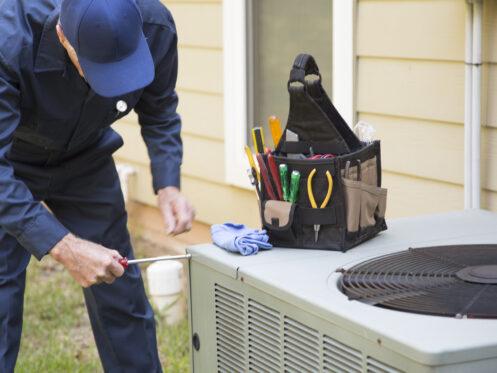Dealing with a malfunctioning air conditioner, especially during extremes of the weather spectrum, can be a frustrating experience. You will have no other choice but to have it fixed for peace of mind. However, before you do so, it’s crucial to determine whether repair is the most prudent option because sometimes, a replacement may be more cost-effective in the long run. Below are some factors to consider.
Signs Your Air Conditioner Needs Attention
Unusual Noises
Your AC system probably isn’t known for its silence, but there’s a difference between the comforting hum of a properly working fan and the clanging of worn-out parts. If you notice any new or excessive noises, especially if they are loud or repetitive, it’s time to investigate further.
Screeching sounds are often indicative of a malfunctioning fan motor in the outdoor condenser unit. There are situations where the screeching stops once the unit has warmed up, but that doesn’t mean you should ignore it. The longer you wait, the more serious the damage can become.
Hissing or bubbling noises could indicate a refrigerant leak, which can be harmful to both your AC and your health if left unchecked. The refrigerant is a chemical that absorbs heat from the air, and any leaks can result in poor cooling performance or complete system failure.
Popping sounds could be a sign of deteriorating ductwork. This happens because the air ducts expand and contract under pressure. This noise may be more noticeable in hot or cold weather when the pressure differences between inside and outside your home are greater.
If you hear banging or rattling noises, something has come loose inside your AC. It might be a bolt, a screw, or perhaps a fan blade that’s come off balance. Either way, these noises should never be ignored, as they can cause serious damage to your unit if left without repair.
Short Cycling
When a contractor was installing your AC for the first time in your house, they made calculations to ensure that the system would be large enough to cool your home effectively. But if you’ve made renovations or added square footage since then, your unit might not have the capacity to handle it. You’ll start to notice that certain rooms or areas of your house are not as cool as others, or it’s turning on and off more frequently than usual. This phenomenon is known as short cycling.
It could also result from a malfunctioning thermostat, clogged air filters, or low refrigerant levels. Short cycling can cause severe damage to your compressor (the part that cools the air) and should be addressed as soon as possible to avoid costly repairs or replacements.
Poor Airflow
Low airflow is often a sign of a clogged air filter. As the filter becomes dirty and clogged with dust, pet hair, and other debris, it restricts the flow of air through your system. This not only affects the cooling performance but also puts extra strain on your AC unit, leading to increased energy consumption and potential breakdowns.
Odd Smells
Next, there are odors that your AC shouldn’t produce. In fact, your system should never produce any odor at all. If the air that comes out of your vent registers smells musty, there may be microbiological contaminants present. It could also mean that you have a humidity problem in your home, which is known to promote the growth of pathogens.
A rotten-egg smell could suggest that there’s a gas leak somewhere in your system, which could be dangerous and should be addressed immediately. On the other hand, a burning smell could indicate an electrical problem or overheating components that need to be checked by a professional.
When to Repair
Firstly, if your system is practically new (less than ten years), consider repairing it when an issue develops. Most of its parts are barely worn out, and a quick fix could give you a couple of more years. A good system should last almost 20 years if you conduct regular maintenance.
Secondly, it’s wise to go for repair if the cost of the repair is less than half the cost of a new AC unit. Most people use the ‘5,000 rule’ to gauge this. It proposes that to determine the most cost-effective route, you should multiply the cost of the repair needed by the age of the unit in years. If the result of this calculation comes out to be less than $5,000, then opting to repair the item is considered the more financially prudent choice.
Thirdly, if your system’s warranty is still valid, it’s best to opt for repair as long as the issue is covered by the warranty. Consider going over your manufacturer’s warranty terms to understand what is covered before making a decision.
Fourth, it’s prudent to prepare for seasons that can be especially challenging for your air conditioning unit, like winter and summer. Undertaking some preventative maintenance, especially on parts that are susceptible to wear and tear, can help avert any major breakdowns or issues during these seasons.
Lastly, if efficiency is still good. If your energy bills are still reasonable and you are getting the desired cooling and heating from your system, then repairing might be a better option. Your system is still in good condition, and regular maintenance can help prolong its lifespan.
The Replacement Scenario
Age is the number one determinant when it comes to replacing your AC system. If the system is close to or over twenty years, then a replacement might be necessary. This is because most of its parts would have worn out and repairs will only be a temporary solution.
The second factor is a major component failure. If something like the compressor fails, it’s best to replace the whole system because individual part replacements can be costly and may not guarantee optimal performance. In fact, it’s likely to experience issues much sooner and more frequently because other parts of your old AC will be under more stress to keep up with the new component.
Thirdly, if your AC becomes a money pit. If you are frequently calling an HVAC technician to fix your system and the costs keep adding up, then it might be time to consider a replacement. You should know that frequent damages have a compounding effect, and in the long run, it will cost you more to keep repairing than to replace.
Another factor to consider is if your AC unit uses R-22 refrigerant. This type of refrigerant has been phased out due to its harmful effects on the environment. If your system still uses it, then a replacement would not only be necessary but also beneficial for the environment.
Replacement is also a good idea if you are planning to sell your home in the near future. A new and efficient AC unit can increase the value of your home and attract potential buyers.
Finally, if you are looking for modern features and better energy efficiency, then a replacement might be the best option. Newer models have advanced features such as programmable thermostats and energy-saving technologies that can help reduce your utility bills. Replacement may also give you a chance to try out other types of air conditioners, like ductless mini splits or heat pumps, which are becoming increasingly popular due to their energy efficiency and zoning capabilities.
Contact Cowboys Air Conditioning & Heating Today For More Information
Staying vigilant of any unusual signs from your AC unit and knowing when it’s time for a replacement is crucial for maintaining a comfortable and functional home. If you live around San Antonio, TX, call Cowboys Air Conditioning & Heating today for all your AC replacement and repair needs. Our team of experienced technicians will assess your current system and provide expert advice on whether a replacement is necessary. In addition to our core offerings, we provide a comprehensive range of services, including air sealing and insulation, ductwork sealing, repair and replacement, routine maintenance, and solutions to improve indoor air quality.







